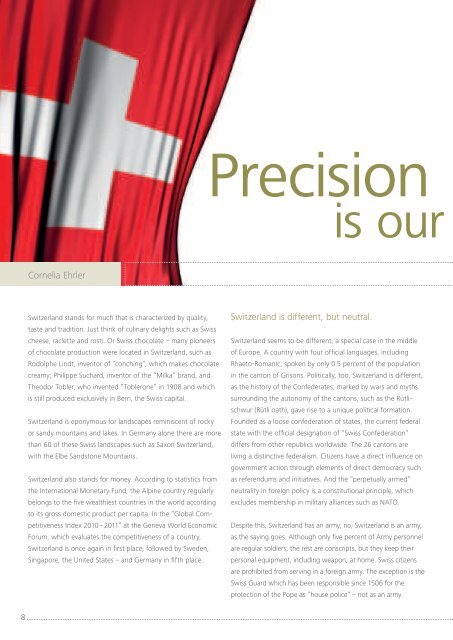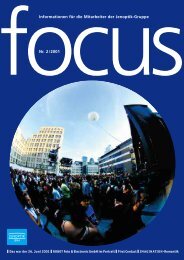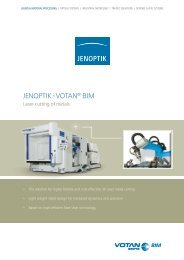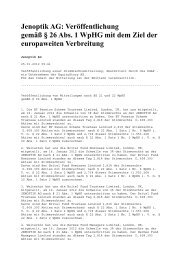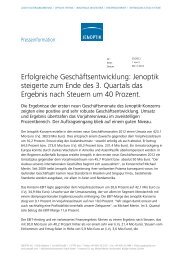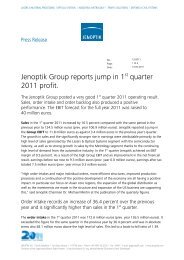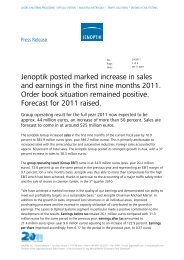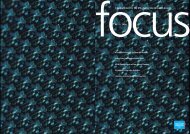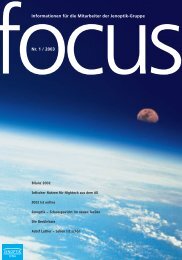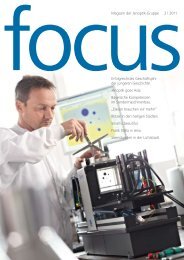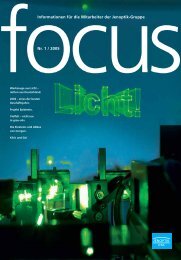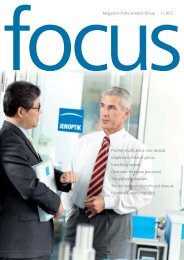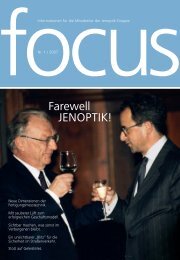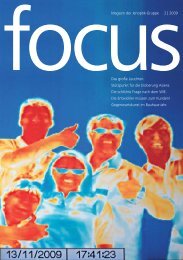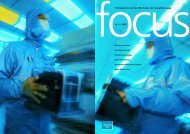1/2011 - Jenoptik AG
1/2011 - Jenoptik AG
1/2011 - Jenoptik AG
You also want an ePaper? Increase the reach of your titles
YUMPU automatically turns print PDFs into web optimized ePapers that Google loves.
Cornelia Ehrler<br />
Switzerland stands for much that is characterized by quality,<br />
taste and tradition. Just think of culinary delights such as Swiss<br />
cheese, raclette and rosti. Or Swiss chocolate – many pioneers<br />
of chocolate production were located in Switzerland, such as<br />
Rodolphe Lindt, inventor of “conching”, which makes chocolate<br />
creamy; Philippe Suchard, inventor of the “Milka” brand, and<br />
Theodor Tobler, who invented ”Toblerone” in 1908 and which<br />
is still produced exclusively in Bern, the Swiss capital.<br />
Switzerland is eponymous for landscapes reminiscent of rocky<br />
or sandy mountains and lakes. In Germany alone there are more<br />
than 60 of these Swiss landscapes such as Saxon Switzerland,<br />
with the Elbe Sandstone Mountains.<br />
Switzerland also stands for money. According to statistics from<br />
the International Monetary Fund, the Alpine country regularly<br />
belongs to the five wealthiest countries in the world according<br />
to its gross domestic product per capita. In the “Global Competitiveness<br />
Index 2010 – <strong>2011</strong>” at the Geneva World Economic<br />
Forum, which evaluates the competitiveness of a country,<br />
Switzerland is once again in first place, followed by Sweden,<br />
Singapore, the United States – and Germany in fifth place.<br />
Precision<br />
Switzerland is different, but neutral.<br />
Switzerland seems to be different, a special case in the middle<br />
of Europe. A country with four official languages, including<br />
Rhaeto-Romanic, spoken by only 0.5 percent of the population<br />
in the canton of Grisons. Politically, too, Switzerland is different,<br />
as the history of the Confederates, marked by wars and myths<br />
surrounding the autonomy of the cantons, such as the Rütlischwur<br />
(Rütli oath), gave rise to a unique political formation.<br />
Founded as a loose confederation of states, the current federal<br />
state with the official designation of ”Swiss Confederation”<br />
differs from other republics worldwide. The 26 cantons are<br />
living a distinctive federalism. Citizens have a direct influence on<br />
government action through elements of direct democracy such<br />
as referendums and initiatives. And the “perpetually armed”<br />
neutrality in foreign policy is a constitutional principle, which<br />
excludes membership in military alliances such as NATO.<br />
Despite this, Switzerland has an army, no, Switzerland is an army,<br />
as the saying goes. Although only five percent of Army personnel<br />
are regular soldiers, the rest are conscripts, but they keep their<br />
personal equipment, including weapon, at home. Swiss citizens<br />
are prohibited from serving in a foreign army. The exception is the<br />
Swiss Guard which has been responsible since 1506 for the<br />
protection of the Pope as ”house police” – not as an army.<br />
Switzerland is known for utmost precision. No wonder<br />
that two <strong>Jenoptik</strong> divisions, which are both very precise,<br />
are represented in the Confederation: Industrial Metrology<br />
with Hommel-Movomatic Suisse SA and Traffic Solutions<br />
with Multanova <strong>AG</strong>.<br />
is our Business.<br />
The Swiss government, the Federal Council with seven members, is tradition-<br />
ally regarded as the most stable executive authority in the world. Equally<br />
reliable are the conditions for foreign employers who appreciate the high<br />
productivity and excellent infrastructure in Switzerland. Some 1,200 German<br />
companies employ about 107,000 people in Switzerland through subsidiaries,<br />
sales offices or investment holdings. <strong>Jenoptik</strong> is one of these companies; its<br />
two subsidiaries from the Metrology segment live the traditional Swiss<br />
understanding of precision:<br />
Precision is our business.<br />
The <strong>Jenoptik</strong> Industrial Metrology division has a presence in Switzerland with<br />
its subsidiary Hommel-Movomatic Suisse SA. <strong>Jenoptik</strong> acquired the French<br />
metrology specialists ETAMIC SA in 2006, which had already included Swiss<br />
Movomatic SA since 1993. In 2007, the Etamic-Movomatic Group was merged<br />
worldwide with the <strong>Jenoptik</strong> subsidiary Hommelwerke GmbH in Villingen-<br />
Schwenningen to Hommel-Etamic.<br />
The Swiss team of Hommel-Movomatic Suisse SA currently has about 30<br />
employees at the Peseux location on the shores of Lake Neuchâtel in the<br />
north-western canton of Neuchâtel. The origin of Movomatic lies in the<br />
so-called “Watch Valley” between Basel and Geneva. In 1937, in this area<br />
characterized by watch making and precision mechanics, the company<br />
”Motomechanik” was founded in Inkwil which, a few years later in 1950,<br />
specialized in ”in-process metrology”, i.e. in measurement technologies that<br />
Switzerland and money.<br />
It is also the sums of money in Swiss banks that are<br />
notorious; Credit Suisse is probably the most recognized<br />
bank. The almost mythically inflated Swiss banking secret<br />
has now been somewhat superseded by the cooperation<br />
between Germany and Switzerland in tax matters:<br />
In October 2010, both countries signed a protocol on a<br />
double taxation agreement, which governs the exchange<br />
of information between the two countries. In addition,<br />
a withholding tax for the accounts of foreign customers<br />
is planned, which is to be transferred to the countries of<br />
origin of the bank customers.<br />
Even more problematic is how to deal with so-called potentate<br />
funds, money from dictators, which usually stems<br />
from corruption or other shady sources. The government<br />
recently barred the assets assigned to the recently<br />
deposed Egyptian head of government Mubarak, Ben<br />
Ali of Tunisia and the Libyan ruler Gaddafi by emergency<br />
decree in Bern. Overall, these potentate assets from<br />
North Africa are believed to amount to 830 million francs<br />
(approx. 660 million euros). Since the late 1990s, in<br />
order to combat financial crime, Switzerland has drafted<br />
anti-money laundering laws, which impose special duties<br />
of care on Swiss banks. According to the Swiss Foreign<br />
Ministry, in the past 15 years Switzerland has been able<br />
to return 1.2 billion euros of confiscated dictator funds to<br />
the respective countries of origin.<br />
8 9


